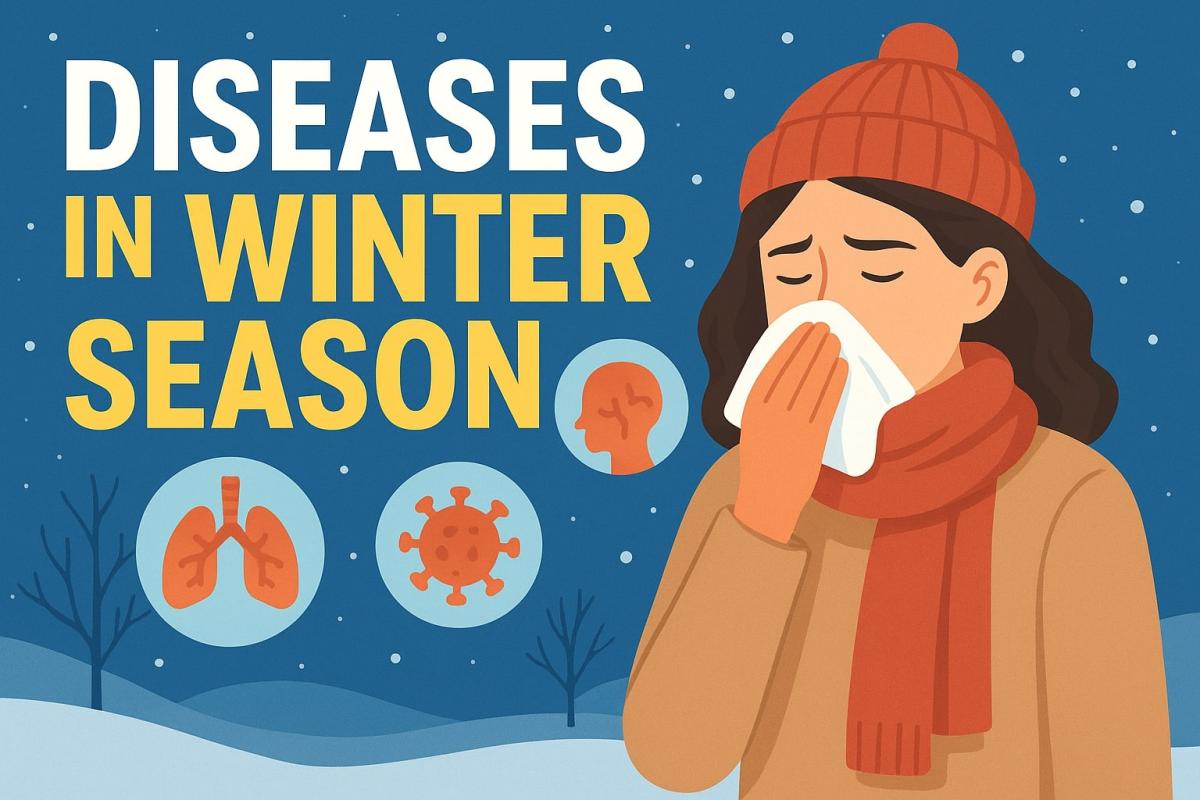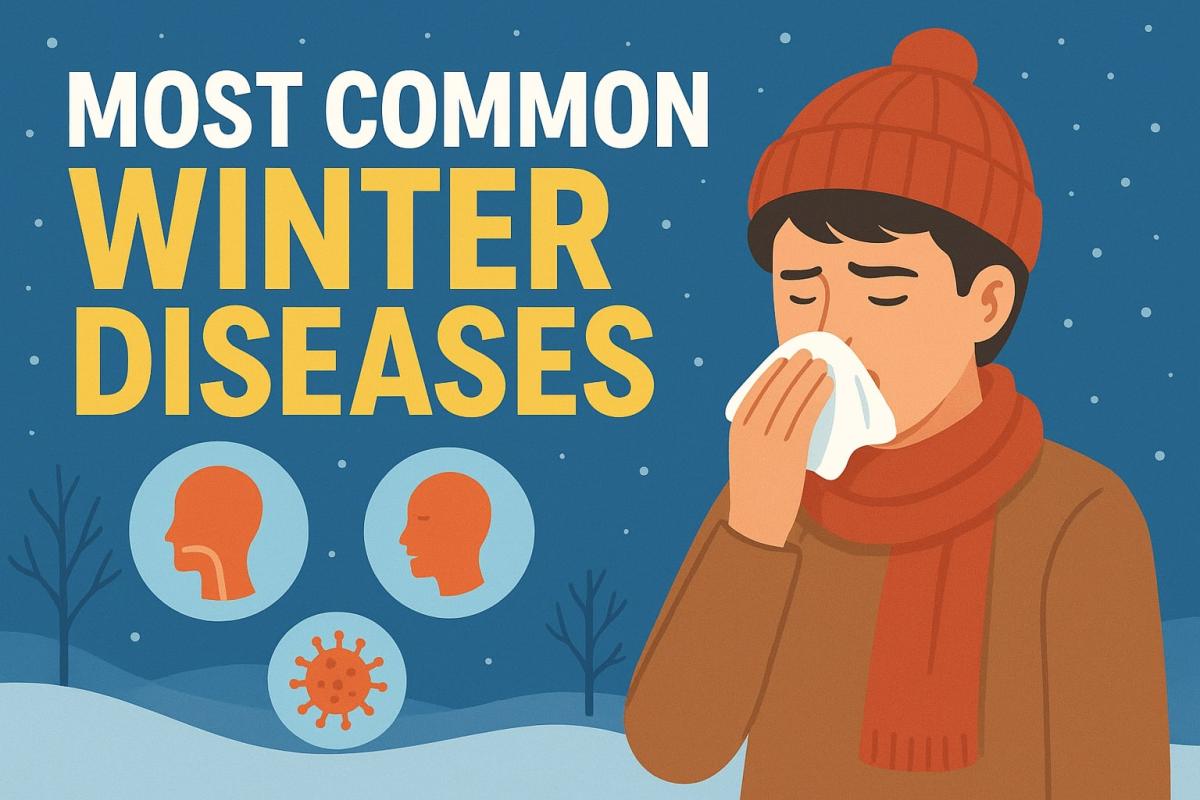Most Common Diseases In Winter Season

As the temperature begins to drop and chilly winds set in, many people start preparing for cozy evenings and warm beverages. But while winter brings comfort and celebrations, it also ushers in a wave of health concerns that quietly affect people of all ages. The cold season weakens our immune system, allowing various viruses and bacteria to thrive, increasing the risk of infections and chronic flare-ups.
Surprisingly, most people don’t realize how seasonal shifts influence overall health until symptoms appear , a runny nose, a lingering cough, or even painful skin dryness. That’s why it’s essential to understand what actually happens inside your body during the cold months and which illnesses become more prevalent.
If you’re curious to know which ailments spike during this time, you can explore a detailed breakdown of the diseases in winter season that affect people most frequently and learn how to prevent them effectively.
Why Winter Impacts Health So Severely
Winter brings a sudden dip in temperature, changes in humidity levels, and reduced exposure to sunlight — all of which influence your body’s natural defense mechanisms.
Here are some biological and environmental reasons why this happens:
Weakened Immune Response:
During cold weather, blood vessels constrict to preserve body heat, slightly reducing the efficiency of white blood cells to reach infected areas. As a result, your immune response slows down, making you more prone to catching infections.
Limited Vitamin D Exposure:
Reduced sunlight means less vitamin D synthesis in the skin, which directly affects immune regulation. Low vitamin D levels are linked with frequent colds, respiratory infections, and even mood swings.
Dry Air and Dehydration:
Cold air tends to be drier, and indoor heating systems further strip humidity from the air. This dryness irritates the nasal passages and throat, allowing pathogens to enter more easily.
Close Human Contact:
In winter, people spend more time indoors, often in poorly ventilated rooms. This increases the transmission of airborne viruses and bacteria through coughing, sneezing, or simple conversations.
All these factors together create a perfect breeding ground for seasonal infections — some mild, others more serious.
The Subtle Onset of Seasonal Illnesses
Unlike summer or monsoon, where diseases are often acute and visible, winter ailments tend to appear gradually and subtly. A sore throat one day, a mild headache the next — and before you know it, it evolves into something that requires medication.
Most of these illnesses share overlapping symptoms like fever, body aches, cough, fatigue, and nasal congestion, making self-diagnosis difficult. This is why understanding the underlying causes and early warning signs becomes crucial.
However, to truly recognize and prevent these conditions effectively, it’s essential to know which ones dominate this season — and you can learn about them in depth by exploring the diseases in winter season that tend to recur each year.

How Lifestyle Contributes to Winter Health Issues
While weather plays a significant role, lifestyle habits often amplify the risk of falling sick during winter. Here’s how:
Reduced Physical Activity:
Cold weather discourages outdoor exercise, leading to lower metabolism, sluggish immunity, and even weight gain — all of which can influence how your body responds to infections.
Poor Hydration:
People often forget to drink enough water during winter, assuming they’re not sweating. However, dehydration can dry out mucous membranes, making it easier for pathogens to invade.
Comfort Food Cravings:
High-sugar, high-fat foods may give temporary warmth and pleasure but weaken immune resilience. A diet lacking in fresh fruits and vegetables limits the intake of vitamins A, C, and E — key antioxidants that support immune health.
Overreliance on Heating Devices:
Prolonged use of heaters and blowers depletes indoor air humidity, causing skin dryness, throat irritation, and respiratory discomfort.
Maintaining a balanced winter lifestyle with proper nutrition, hydration, and physical activity can significantly lower your chances of catching seasonal infections.
The Link Between Weather and Immunity
Your immune system is like an adaptable shield , constantly adjusting to environmental changes. However, during winter, several natural defenses weaken:
The mucus lining in the nose and throat becomes less effective at trapping germs.
The cilia, tiny hair-like structures in the respiratory tract, slow down due to cold air exposure, reducing their ability to expel microbes.
The body also experiences stress from temperature fluctuations, which can suppress immune function temporarily.
Additionally, cold weather impacts people with chronic illnesses such as asthma, arthritis, and cardiovascular disease more severely. The body’s effort to maintain warmth can increase blood pressure and stress levels, leading to symptom flare-ups.
To better understand how cold conditions specifically trigger illnesses, you can explore a comprehensive list of diseases in winter season where these effects become more evident.
Preventive Health Measures During Winter
The good news is that most winter-related illnesses are preventable with consistent hygiene, nutrition, and lifestyle habits. Here are some scientifically backed tips:
Boost Immunity Naturally:
Include citrus fruits, green leafy vegetables, nuts, and herbal teas in your diet. Foods rich in vitamin C, zinc, and antioxidants are crucial for maintaining a strong immune defense.
Stay Hydrated:
Warm water, soups, and herbal infusions can help maintain fluid balance while keeping your body warm.
Maintain Indoor Humidity:
Use a humidifier or keep bowls of water near heaters to balance indoor air moisture. This can help reduce throat irritation and nasal dryness.
Layer Up Wisely:
Dress in breathable layers rather than heavy clothing. Overheating and sweating inside thick clothes can sometimes make you more susceptible to chills when exposed to cold air.
Practice Hygiene Discipline:
Frequent hand washing, disinfecting surfaces, and avoiding close contact with infected individuals can drastically reduce viral transmission.
Stay Physically Active:
Even indoor exercises such as yoga, stretching, or resistance training can boost circulation and immunity.
These measures not only reduce your risk of infections but also improve your energy levels and mental well-being throughout the cold season.
Who Is at Higher Risk During Winter
While everyone experiences the effects of cold weather differently, certain groups are more vulnerable:
Children and Infants: Their immune systems are still developing, making them prone to frequent infections.
Elderly Individuals: Age-related decline in immunity increases susceptibility to respiratory illnesses.
People with Chronic Diseases: Those with asthma, heart disease, diabetes, or arthritis experience aggravated symptoms in winter.
Healthcare and Outdoor Workers: Continuous exposure to cold or contaminated environments increases their infection risk.
Recognizing your personal vulnerability helps in taking early preventive steps — such as vaccinations, dietary adjustments, and regular health check-ups.
When to See a Doctor
Not every winter cough or sore throat requires medication, but persistent or worsening symptoms should not be ignored. Seek medical advice if you experience:
Fever lasting more than three days
Shortness of breath or chest pain
Severe throat or ear pain
Chronic fatigue or dehydration
Any symptom that interferes with daily activities
A doctor can diagnose whether your condition is mild or related to one of the more common diseases in winter season and prescribe the right course of treatment.
Final Thoughts
Winter may be a season of comfort, but it also tests your body’s resilience. By maintaining a strong immune system, following preventive habits, and recognizing the early warning signs of illness, you can stay healthy and active all season long.
If you’d like to understand exactly which conditions affect people most during the cold months, their causes, and preventive remedies, visit the complete guide to diseases in winter season and discover how to keep yourself and your family safe through the chilliest days of the year.